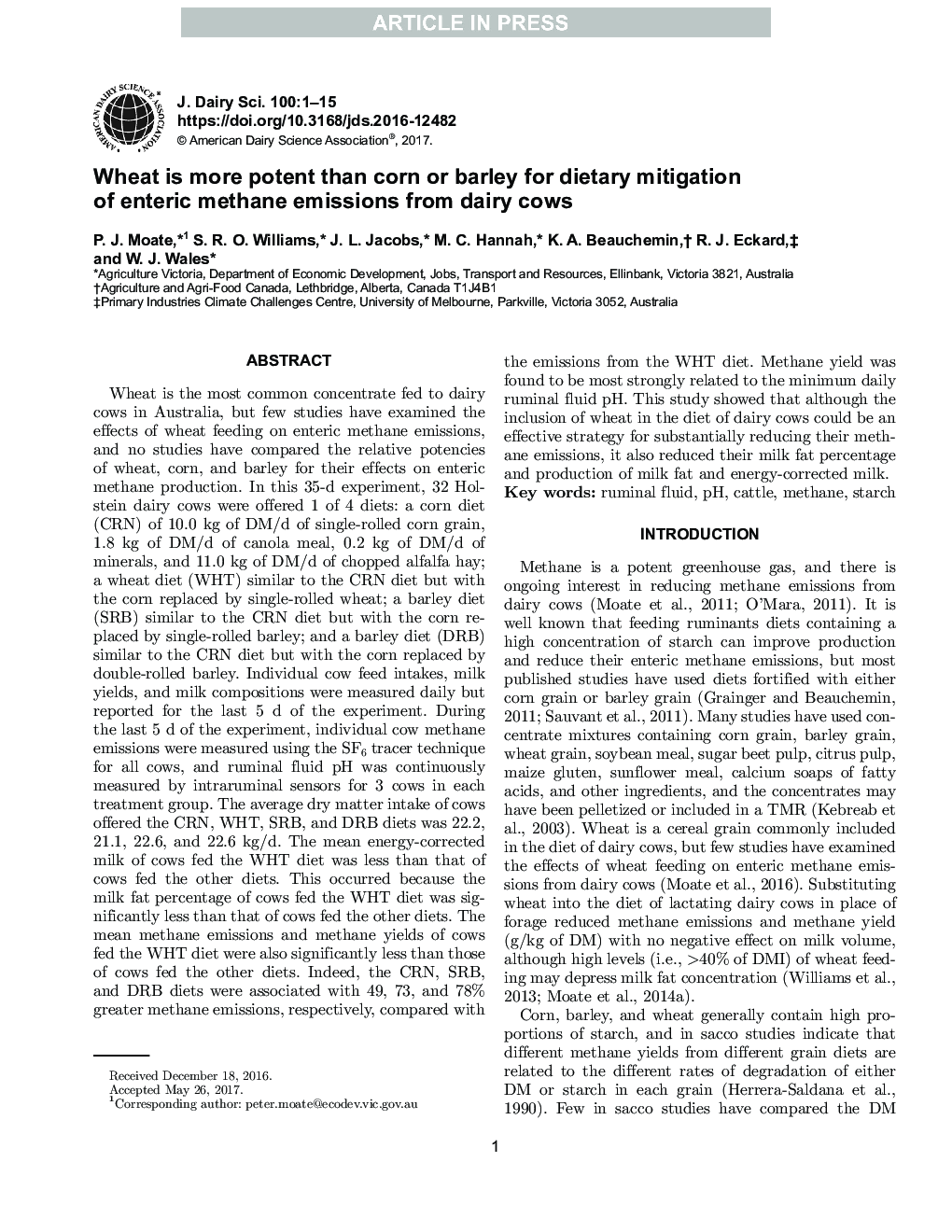| کد مقاله | کد نشریه | سال انتشار | مقاله انگلیسی | نسخه تمام متن |
|---|---|---|---|---|
| 5542079 | 1402514 | 2017 | 15 صفحه PDF | دانلود رایگان |
عنوان انگلیسی مقاله ISI
Wheat is more potent than corn or barley for dietary mitigation of enteric methane emissions from dairy cows
ترجمه فارسی عنوان
گندم از ذرت یا جو بهتر است برای کاهش رژیم غذایی از گازهای گلخانهای متشکل از گاوهای شیری
دانلود مقاله + سفارش ترجمه
دانلود مقاله ISI انگلیسی
رایگان برای ایرانیان
موضوعات مرتبط
علوم زیستی و بیوفناوری
علوم کشاورزی و بیولوژیک
علوم دامی و جانورشناسی
چکیده انگلیسی
Wheat is the most common concentrate fed to dairy cows in Australia, but few studies have examined the effects of wheat feeding on enteric methane emissions, and no studies have compared the relative potencies of wheat, corn, and barley for their effects on enteric methane production. In this 35-d experiment, 32 Holstein dairy cows were offered 1 of 4 diets: a corn diet (CRN) of 10.0 kg of dry matter (DM)/d of single-rolled corn grain, 1.8 kg of DM/d of canola meal, 0.2 kg of DM/d of minerals, and 11.0 kg of DM/d of chopped alfalfa hay; a wheat diet (WHT) similar to the CRN diet but with the corn replaced by single-rolled wheat; a barley diet (SRB) similar to the CRN diet but with the corn replaced by single-rolled barley; and a barley diet (DRB) similar to the CRN diet but with the corn replaced by double-rolled barley. Individual cow feed intakes, milk yields, and milk compositions were measured daily but reported for the last 5 d of the experiment. During the last 5 d of the experiment, individual cow methane emissions were measured using the SF6 tracer technique for all cows, and ruminal fluid pH was continuously measured by intraruminal sensors for 3 cows in each treatment group. The average DM intake of cows offered the CRN, WHT, SRB, and DRB diets was 22.2, 21.1, 22.6, and 22.6 kg/d. The mean energy-corrected milk of cows fed the WHT diet was less than that of cows fed the other diets. This occurred because the milk fat percentage of cows fed the WHT diet was significantly less than that of cows fed the other diets. The mean methane emissions and methane yields of cows fed the WHT diet were also significantly less than those of cows fed the other diets. Indeed, the CRN, SRB, and DRB diets were associated with 49, 73, and 78% greater methane emissions, respectively, compared with the emissions from the WHT diet. Methane yield was found to be most strongly related to the minimum daily ruminal fluid pH. This study showed that although the inclusion of wheat in the diet of dairy cows could be an effective strategy for substantially reducing their methane emissions, it also reduced their milk fat percentage and production of milk fat and energy-corrected milk.
ناشر
Database: Elsevier - ScienceDirect (ساینس دایرکت)
Journal: Journal of Dairy Science - Volume 100, Issue 9, September 2017, Pages 7139-7153
Journal: Journal of Dairy Science - Volume 100, Issue 9, September 2017, Pages 7139-7153
نویسندگان
P.J. Moate, S.R.O. Williams, J.L. Jacobs, M.C. Hannah, K.A. Beauchemin, R.J. Eckard, W.J. Wales,
